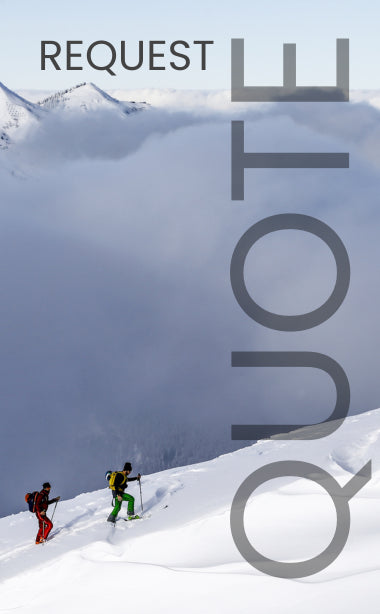You have no items in your shopping cart.
If your desire to travel has itched at you over the years, you've probably been to a number of incredible destinations around the world: Paris, Tokyo, Machu Picchu, Denali National Park, and countless other places. From mountain highs to the depths of the sea, you've come to accept one universal truth: the more you explore and travel, the more places there are that you need to explore and travel. That's just how the "traveling bug" works.
Staying Connected And Prepared Out In The World
While go-to travel destinations can take you to many incredible places around the world, you may want to visit more remote areas like the peaks of the Himalayas to the Serengeti of Africa. You can't always rely on typical resources to be accessible given the remote nature of these areas, so extreme travel warrants a modified approach to packing for your trip and getting around.
Fortunately, when it comes to communication, our satellite phones for sale here at Outfitter Satellite will keep you connected. If there's an expedition down the pipeline for you, we recommend renting a satellite phone for the duration of your trip. Our satellite phones for rent offer global coverage and range in overall durability, GPS tracking abilities, SMS capability, weather resistance features, and more.
Your Source For Iridium Satellite Phones For Rent
At Outfitter Satellite, we're an authorized Iridium reseller, but we also specialize in renting satellite phones. From the Iridium 9575 (Extreme), Iridium 9555, Iridium GO!, and Inmarsat BGAN, there's a perfect option for you to stay connected when you're out in the remote wilderness.
Need satellite phones for an entire fleet, or going on a long-term trip? Outfitter Satellite also offers shared fleet airtime bundle discounts and long-duration rentals. Contact our online satellite phone store today with any questions!
Here are some important travel tips to keep in mind if you're headed to a remote area for an extended period of time.
Checking Up On The Conditions Prior To Your Departure
If you're planning on flying into the capital city of a country known for frequent political unrest or conflict, it's a smart idea to check the travel advisories board provided by the United States Department of State. These advisories will provide with you with pertinent information essential to a safe travel experience. Information on developing natural disasters and changing weather patterns is also something that you should look into before leaving.
The travel advisory levels are as follows:
Exercise Normal Precautions
Exercise Increased Caution
Reconsider Travel
Do Not Travel
It's better to put off your travel plans than fly to a country where there's a serious chance that you could be injured, or worse.
Immunizations
When visiting developing countries or areas known for specific disease outbreaks, it’s important to fortify your immune system with a strain-specific vaccination. Even if you are going to be far away from civilization or human contact beyond your immediate group, you’ll likely fly through a capital city or somewhere populated with people, so a simple immunization can save you from contracting a serious illness or disease.
This country-by-country map provided by the CDC is a helpful resource.
Essential Supplies
Like any other expedition or outdoor trip, you’ll want to be thoroughly prepared in the supplies that you bring. Even if it means carrying unnecessary weight, it’s always better to have more than you need as opposed to running out of supplies. Watch just about any mountaineering documentary out there and you’ll know what we mean…
Bottled Water And Other Clean Water Sources
Water in single-use plastic bottles is wasteful, but in certain instances, it may be your only clean water source. Boiling snow is a great way to produce safe drinking water if you’re in a mountainous locale — remember, though, that the higher you are in elevation, the more energy you’ll need to make water due to the decreased atmospheric pressure.
Other rapid water purification solutions include iodine tablets (not recommended due to the off-putting taste), carbon water pumps, water purification straws, and products that kill bacteria with a UV light.
Dried, Safe To Eat Food
If food sources are going to be scarce or you’re not planning on purchasing much food overseas, make sure to bring plenty of ready to eat meals in the form of dehydrated food. Though not as appetizing as “real� food, all it takes to make a meal is hot water and a few minutes. Plus, they’re generally pretty nutritious.
Other types of food that don’t require any refrigeration or cooking such as beef jerky, trail mix, dried fruit, protein bars, and the like are also recommended to bring along with you.
Miscellaneous (But Important) Items
Bring a first aid kit in the event of an emergency. It’s also recommended that you bring a flashlight or headlamp to see at night, an emergency blanket for rapid warmth, and a map of the area in case your GPS batteries die or you simply don’t know where you are.
When packing and preparing for a remote, international expedition is concerned, give this question a lot of thought: What will I need to stay warm, dry, fed, and hydrated in an environment where these supplies may not be readily accessible or available?
Stay Connected With An Iridium Satellite Phone From Us
When a lifeline to the outside world may mean the difference between life and death, it’s essential to have a reliable line of communication on your side. Our online satellite phone store can help connect you with the right satellite phone solution — contact Outfitter Satellite today to get started.
 English
English











